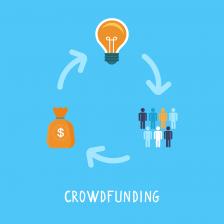The Scoop on Crowdfunding
You’ve probably heard of Kickstarter. But what is it and how does it work? Tech Talker explains the benefits, the drawbacks, and everything else you always wanted to know about crowdfunding.
Listen
The Scoop on Crowdfunding
This week I’m going to talk about crowdfunding – what it is, how it works, what are the benefits and drawbacks, and how to start your own crowdfunding campaign..
What Is Crowdfunding?

Kickstarter is the most popular crowdfunding platform. Here’s an example of how Kickstarter works:
Say I have a band (which would never happen since I can’t sing or play an instrument to save my life, but bear with me). And say I want to record a really professional album at a recording studio that would cost $5,000. If I didn’t have the money, it would be pretty difficult to accomplish. If I decided to go out and solicit funding from potential investors, there’s no guarantee that I would get anywhere (or even find any investors willing to talk to me).
How Does Kickstarter Work?
That’s where Kickstarter comes in. With Kickstarter you sign up for the site, explain what it is you want to do, and how much money it would take make it happen. From there, you can advertise your project on social media, through your friends and family, and any other avenues you choose. People who believe in your vision and want to help it come to life can contribute any amount they want towards your goal.
Often projects will offer an incentive to contributors, such as a free CD if you donate $20 or more. Incentives may also be tiered so that you get more as you contribute more. If the project reaches its goal, Kickstarter gets 5% of the funds as a fee. If the project doesn’t get enough funding to reach its goal, Kickstarter returns the money to the backers. This means it’s all or nothing and no one gets burned for a partially-funded project.
Kickstarter vets the projects that appear on its site and does its best to offer protection from anything that looks like a scam or doesn’t have a chance of delivering on its promises. There’s a time limit on how long projects can be up on Kickstarter – typically anywhere from 30 to 60 days.

Kickstarter also limits what can be crowdfunded. For example you can’t ask for funding for something personal such as a charity you’re supporting or your college tuition. It’s more for projects or businesses that create something (like a film, a cupcake cafe, a new video game, etc.). Furthermore, although you may receive an incentive for contributing to a project, your contribution is viewed as a donation. This means that when you donate to a project, you are not buying shares or a part of the business in any way.
Is Kickstarter Effective?

But these are outliers. According to Kickstarter, the average funding goal is less than $10,000, a pretty modest amount. I’ve seen Kitckstarter in action when two of my friends used it to get their projects off the ground. One was a carbon fiber wallet, and the other was candles made from wine bottles. Both reached their goals and are doing great!
Other Crowdfunding Sites
I’ve been talking about Kickstarter because it is arguably the most well-known crowdfunding website. But it’s not the only one. There are other crowdfunding websites that have different restrictions, requirements, and specializations.
For example, Indiegogo has much looser restrictions than Kickstarter. You can fund personal projects such as college tuition, charity gifts, or anything else you want. Indiegogo is also very popular all around the world which might be better if you’re looking to attract a global audience. There are also crowdfunding sites for specific categories, such as appbackr for app development and Crowdrise for charitable causes.
If you’re more interested in getting investors in a start-up company, rather than simply donations, there is CrowdFunder.com which allows accredited investors to become shareholders in your company. This is different from donation-based backing because investors are looking to profit from the growth of your business or idea.
If this episode has sparked your imagination and you want to start your own campaign, I suggest doing a lot of research on successful projects and the qualities they possessed that made them so popular with backers. Start with an elevator pitch of your idea. How can a potential backer understand and get excited about your project in 30 seconds or less? Then check out who your competitors are and if your incentives can be fulfilled given your project goal.
If you’ve had any experience with backing a crowdfunding campaign or if you’ve ever created your own project on Kickstarter or any other crowdfunding platform, I’d love to hear about it! Post your experience on Follow the link for QDT tech talker or email me at techtalker@quickanddirtytips.comcreate new email.
Well, that’s it for today! Be sure to check out all my earlier episodes at quickanddirtytips.com/tech-talker. And if you have further questions about this podcast or want to make a suggestion for a future episode, post them on Visit QDT tech talker.
Until next time, I’m the Tech Talker, keeping technology simple!
Betterment LLC is an SEC Registered Investment Advisor. Brokerage services are offered by Betterment Securities, an SEC registered broker-dealer and member FINRA/SIPC. Investments are not FDIC Insured. No Bank Guarantee. May Lose Value. Investing in securities involves risks, and there is always the potential of losing money when you invest in securities. Before investing, consider your investment objectives and Betterment’s charges and expenses. Not an offer, solicitation of an offer, or advice to buy or sell securities in jurisdictions where Betterment and Betterment Securities are not registered.
Crowdfunding image courtesy of Shutterstock.

